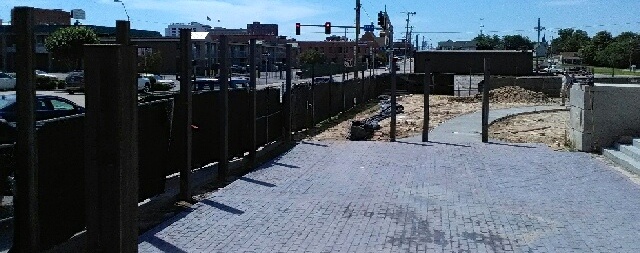Masonic Temple renovation work on track for October opening, but elevator and electrical work causing delays
by June 9, 2016 7:02 am 737 views

Renovation work on the Masonic Temple in downtown Fort Smith includes new steps and fencing.
Sometimes the ups and downs of renovating an historic structure is literally the up and down part of the renovation. That’s the case with work on the almost 90-year-old Masonic Temple in downtown Fort Smith on which installing an elevator has become a “conundrum.”
Lance Beaty, owner of Temple Holdings and Beaty Capital Group, said at a “regulatory and practical level,” the work to install a modern elevator that works with a new purpose for the building, meets historic requirements and meets handicap accessible rules has been tough.
“You have to infill an elevator. Where do you put it? … You have a flow you have to consider with the food and meeting spaces. And you’re doing all that in a building that’s almost 90 years old. How do you make all that work? So it’s been a very methodical process to work through that. It was an unexpected complication. What at first appeared easily solvable has turned out to be quite the conundrum,” Beaty told Talk Business & Politics.
Through Temple Holdings, Beaty acquired the Masonic Temple on November 2014 in a $2.5 million deal. The facility is still on course for an October opening as a “multipurpose event facility” to provide space for concerts, corporate and civic events, televised viewing of major sporting events, and other uses. The 3-story building at 200 N. 11th St. has numerous meeting rooms and a theatre capable of seating 900. It was built in 1928.
Although renovation work has been “complicated by more than 89 years worth of history,” Beaty said he is confident they will meet the October opening and come in at or below an estimated $4.5 million budget.
Non-construction progress made toward the opening includes a contract with TicketFly, a subsidiary of Pandora, for ticket and promotional services. They also have tentative approval of a large-event liquor license from Arkansas’ Alcohol Beverage Control agency. Final approval comes with inspection of the completed facility, Beaty said.
Beaty said he and Temple Live staff have traveled the country to meet with booking agents and others involved in helping bring live music and other productions to the facility. The bad news is that the Fort Smith metro is not a major metro in terms of booking big acts, but the good news is that Fort Smith is close enough to Interstate 40 to make it feasible to catch those big acts as they travel between the larger metro areas.
“That’s been an education,” Beaty said of meeting with those in the entertainment booking industry. “As a venue, we’re not in a major market. But being just seven miles off of I-40, we are on the way to everywhere. We think that will be good for us.”
Progress also is being made with renovations in the theater, possibly the most popular and well-known part of the building. Beaty said work on the theater has been a “sequence of events” that include audio/visual design, work underneath the old floor, and sourcing items that need to be replaced – like the decorative ceiling tiles.
“They haven’t made those in almost 90 years, so how do you address those issues?” Beaty said of their initial challenge with the tiles.
He said they are resolving those problems, including work on the balcony seats. The lower seats were refurbished in the 1960s and, for the most part, are in good shape. But the balcony seats are original to the structure and they just recently found a company that can recondition the 380 balcony seats so that the fabric and color are matched to meet historical standards.
Among the issues remaining are what to do with what Beaty said are the “thousands and thousands of historic artifacts” left by Masons at the Temple, and electrical infrastructure in the alleyway at the back of the building.
Beaty is working with officials at the University of Arkansas at Fort Smith on a plan to best process and preserve the artifacts. That process includes terms on how the items are conveyed and controlled.
“They’ve made us a proposal, and we’ve not accepted it, but frankly we have been more involved in construction than document preservation. I’m not saying that won’t happen, but at this point it has not been done,” Beaty said, adding that he hopes to soon reach an agreement with UAFS.
As to the electrical issue, Beaty said they are waiting on OG&E to “develop an engineering solution” to relocate a large electrical distribution system in the alleyway. The system now prevents safe access to much of the building’s rear wall, Beaty said.
“It’s so close to the building that you can’t paint the back of the building or waterproof the back of the building for fear of electrocuting somebody. That has and continues to be a delay,” Beaty said.
